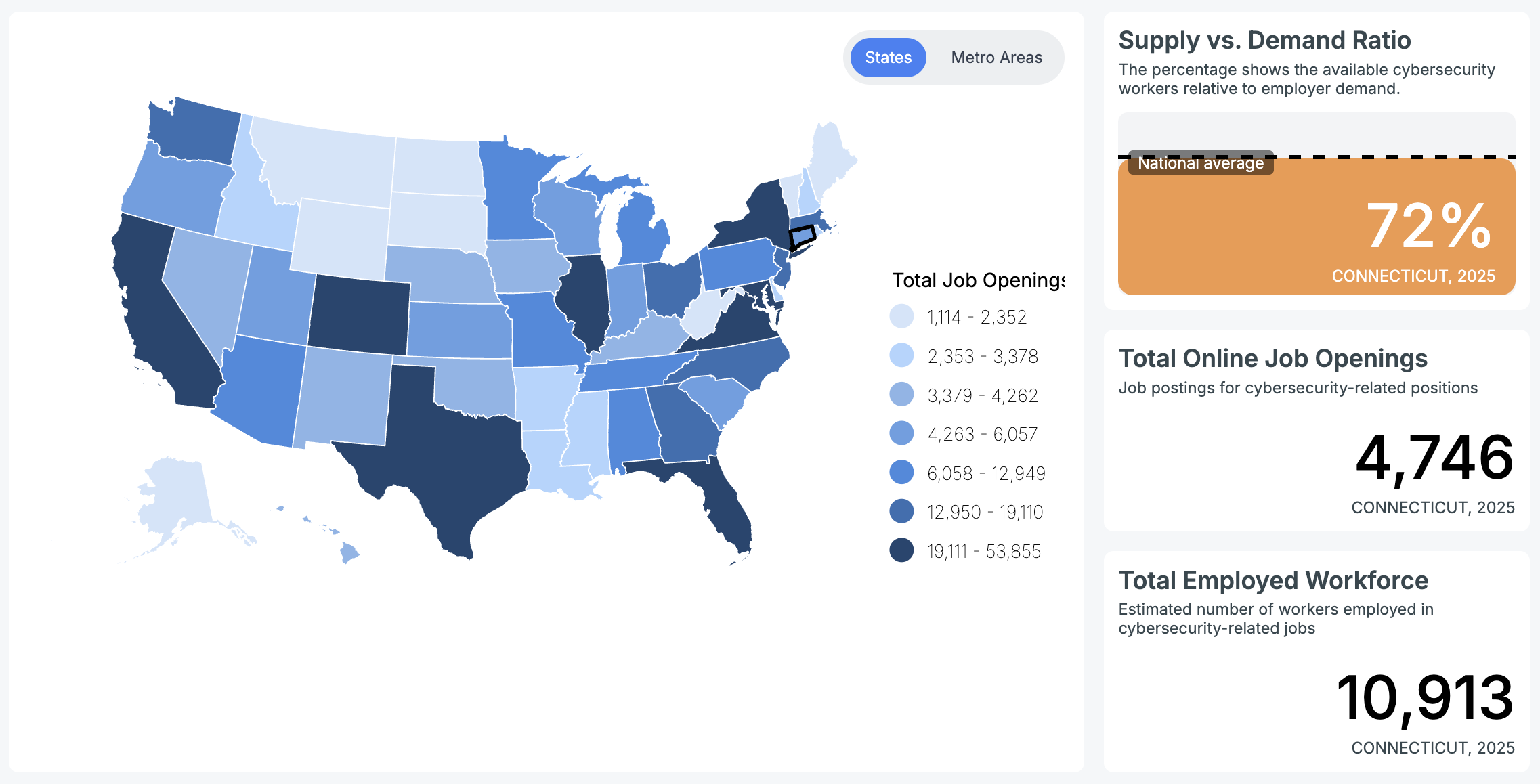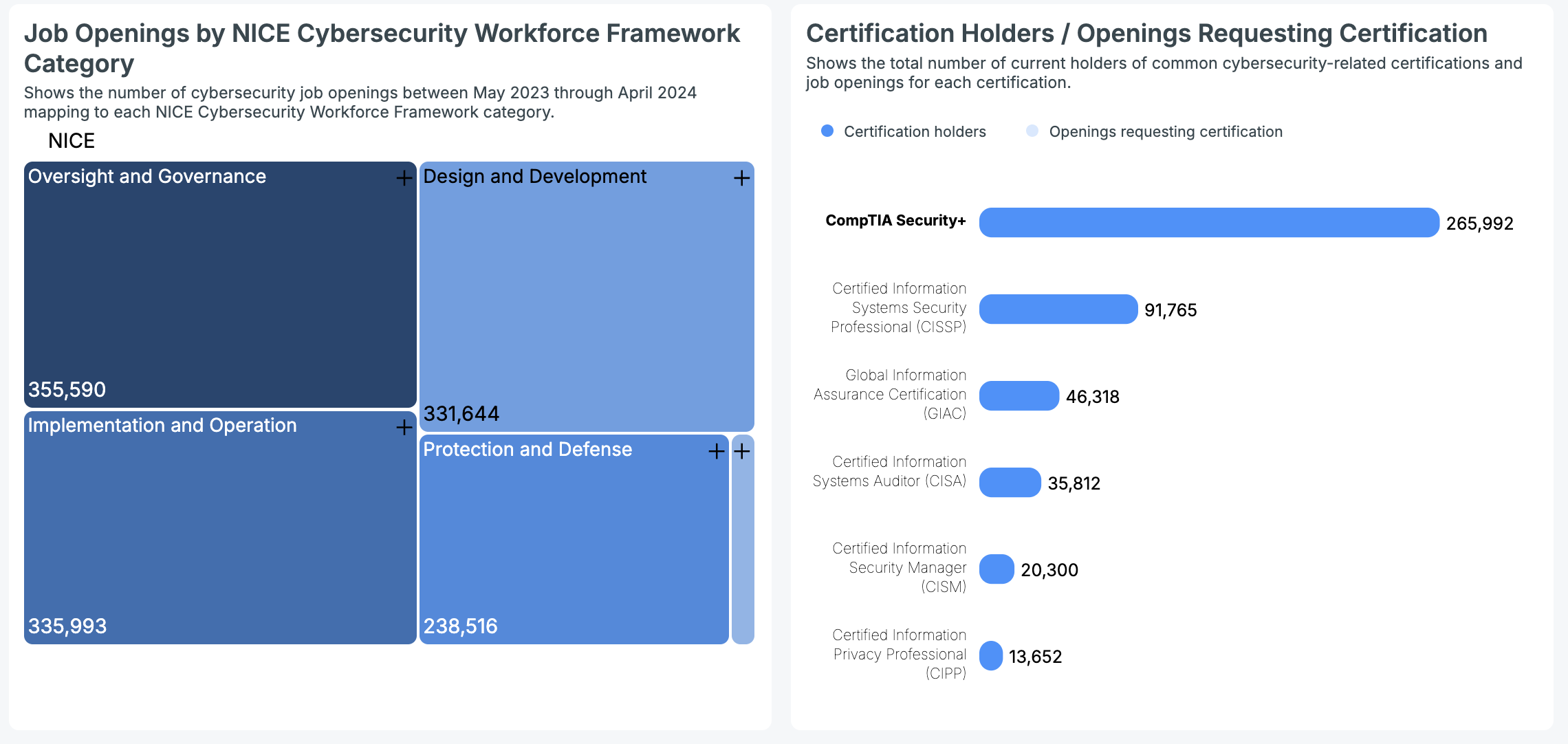- Associate degree
- Bachelor’s degree
- Master’s degree
- Cybersecurity certifications
- Cybersecurity initiatives
- FAQs
Students researching a cybersecurity degree in Connecticut, a cybersecurity school in Connecticut, or available cybersecurity programs in Connecticut will find a range of college pathways aligned to workforce demand across finance, defense contracting, insurance, and healthcare sectors.
This page focuses specifically on degree and school pathways and only references institutions when they operate distinctive workforce, research, or training initiatives.
How we keep this page current
This page is reviewed using data and program verification from the Bureau of Labor Statistics, CyberSeek, the Connecticut Department of Labor, the state cybersecurity office, and the NSF Scholarship for Service program.
Any institution-level claims are verified against official university initiative or research center pages.
Time-sensitive claims are periodically rechecked and removed when outdated.
Ad
cybersecurityguide.org is an advertising-supported site. Clicking in this box will show you programs related to your search from schools that compensate us. This compensation does not influence our school rankings, resource guides, or other information published on this site.
Featured Cybersecurity Degree Programs
| School Name | Program | More Info |
|---|---|---|
| Southern New Hampshire University | Online BS in Cybersecurity or Online MS in Cybersecurity | website |
| Grand Canyon University | Online BS in Cybersecurity | website |
| Fairfield University | Online MS in Cybersecurity | website |
| Purdue Global | Online BS in Cybersecurity | website |
| UC Berkeley School of Information | Master’s in Cybersecurity | No GRE/GMAT Required | website |
Cybersecurity workforce demand in Connecticut
Cybersecurity employment demand is typically evaluated using three different measures: job postings, employment estimates, and long-term projections. Each describes a different part of the workforce pipeline.
- Job postings demand: The CyberSeek Connecticut heat map shows persistent employer demand for cybersecurity workers across the Hartford insurance sector, defense contractors, and healthcare systems.
- State projections: The Connecticut Department of Labor occupational projections track expected growth for information security–related occupations across the state economy.
- Wages and employment levels: The Bureau of Labor Statistics Connecticut occupational employment estimates publish employment counts and wage levels for Information Security Analysts and related IT roles.

How to interpret these numbers
- Job postings measure employer hiring activity—not total jobs.
- Employment estimates measure existing workers—not hiring demand.
- Projections measure expected growth—not guaranteed openings.
Together, they indicate whether schools are training enough graduates to meet employer needs, which is why cybersecurity programs often partner directly with industry.
Cybersecurity degree pathways in Connecticut
Associate degrees
Community college programs typically focus on:
- network defense fundamentals
- operating system administration
- introductory digital forensics
- preparation for entry-level certifications
- Program: Cybersecurity, AS
Credits: 61-63
Cost per credit: $174 in-state | $523 out of state
Delivery Method: Campus
Learn more: Program details
Students should look for programs aligned to employer certification frameworks and articulation agreements into bachelor’s programs rather than choosing solely based on course titles.
Bachelor’s degrees
Bachelor’s programs are the most common pathway into security analyst and engineering roles.
When comparing schools, prioritize programs that include:
- hands-on labs or cyber ranges
- internship or co-op pipelines
- federal CAE designation alignment
- industry advisory boards
Example of a distinctive initiative
- University of New Haven – Cybercrime Investigation & Digital Forensics programs and Cyber Forensics Research & Education Group provide real investigative training environments tied to law enforcement and corporate investigations (official center page).
These types of experiential programs matter more than course naming differences between “cybersecurity,” “information assurance,” or “computer security.”
- Program: Bachelor of Science in Cyber Security
Credits: 120
Cost per credit: $319 in state | $419 out of state
Delivery Method: Online
Learn more: Program details
Master’s degrees
Graduate programs in Connecticut are typically chosen by:
- IT professionals moving into security leadership
- engineers specializing in threat detection or architecture
- students pursuing research careers
Programs with dedicated research labs, security operations centers, or partnerships with federal agencies generally provide stronger preparation than lecture-only degrees.
Example distinctive initiative
University of Connecticut – Center for Hardware Assurance, Security, and Engineering (CHASE) supports secure hardware and system research with government and industry collaboration (official center page).
Campus-based master’s degree
- Program: MS – Cybersecurity
CAE designation: CAE-CD
Credits: 30
Cost per credit: $965
Delivery Method: Campus
Learn more: Program details
Online master’s degree
- Program: Master of Science in Cyber Security
Credits: 30
Cost per credit: $980
Delivery Method: Online
GRE/GMAT Required: Not Required
Learn more: Program details
Certifications and workforce programs
Many Connecticut programs embed certification preparation into coursework rather than offering separate training tracks.

Look for programs mapped to common workforce frameworks such as NICE/NIST rather than isolated certificate classes.
- Program: Certificate in Cybersecurity
Credits: 24
Cost per credit: $183 in state | $550 out of state
Delivery Method: Campus
Learn more: Program details - Program: Cyber Security Fundamental Certificate
Credits: 18
Cost per credit: $329
Delivery Method: Online
Learn more: Program details - Program: Cybersecurity Graduate Certificate
CAE designation: CAE-CD
Credits: 18
Cost per credit: $965
Delivery Method: Campus
Learn more: Program details - Program: Cybersecurity Essentials Certificate
Credits: 22
Cost per credit: $183 in-state | $550 out of state
Delivery Method: Campus
Learn more: Program details
Cybersecurity bootcamps in Connecticut
- Program: Cybersecurity Boot Camp
CAE designation: CAE-R
Credits: 24 Weeks
Cost per credit: $12,995
Delivery Method: Online
Learn more: Program details
Scholarship for Service (SFS)
The federal CyberCorps Scholarship for Service provides tuition funding in exchange for government cybersecurity employment after graduation.
Connecticut participating institutions include programs listed through the official SFS program directory (SFS participating institutions).
Unique Connecticut cybersecurity initiatives
State cybersecurity coordination
Connecticut operates statewide cybersecurity governance through state IT and emergency services leadership coordinating infrastructure protection and workforce readiness (Connecticut cybersecurity resources).
Federal CAE-aligned education ecosystem
Several Connecticut universities hold National Security Agency/DHS Center of Academic Excellence designations, which align curriculum to federal workforce standards (CAE program information).
Applied cyber investigation training
University-affiliated digital forensics programs partner with law enforcement and corporate incident-response teams, giving students exposure to real investigative workflows rather than simulated coursework alone (University of New Haven cyber forensics group).
These initiatives are particularly important because cybersecurity hiring often favors candidates with investigative or operational experience over purely theoretical training.
Frequently asked questions about cybersecurity degrees in Connecticut
The exact number changes regularly, but the CyberSeek Connecticut heat map consistently shows ongoing employer demand across finance, healthcare, and insurance sectors.
Wage data for Information Security Analysts is published by the Bureau of Labor Statistics Connecticut occupational employment page. Salaries vary by experience, specialization, and industry.
The best program is usually one with hands-on labs, internships, and industry partnerships rather than the program name alone.
Many institutions offer hybrid or online formats, but students should verify lab access or virtual cyber-range availability before enrolling.
Yes — but long-term career mobility is typically stronger with a degree plus certifications rather than bootcamp-only training.
Employers commonly request foundational certifications aligned to industry frameworks referenced in job postings tracked by CyberSeek.
Yes — ongoing job postings and state labor projections both indicate sustained demand for security professionals (Connecticut Department of Labor projections).
Yes. Many students begin with a community college program and transfer into a bachelor’s degree pathway.
Associate: ~2 years
Bachelor’s: ~4 years
Master’s: ~1–2 years depending on background
Yes. Students can attend approved schools listed in the federal SFS directory (SFS program).
Insurance, financial services, healthcare, defense contractors, and state government agencies regularly hire security professionals (CyberSeek state data).
Entry-level positions often include security analyst, SOC analyst, and IT security specialist roles based on postings tracked by CyberSeek.
Sources
- Bureau of Labor Statistics | Occupational Employment Statistics—Connecticut | Accessed February 17, 2026
- CyberSeek | Cybersecurity Supply/Demand Heat Map | Accessed February 17, 2026
- Connecticut Department of Labor | Labor Market Information Division | Accessed February 17, 2026
- Connecticut State Cybersecurity Resources | State cybersecurity information portal | Accessed February 17, 2026
- NSA/DHS Centers of Academic Excellence | CAE program overview | Accessed February 17, 2026
- CyberCorps Scholarship for Service | Participating schools directory | Accessed February 17, 2026
- University of New Haven | Cyber Forensics Research & Education Group | Accessed February 17, 2026
- University of Connecticut | Center for Hardware Assurance, Security, and Engineering (CHASE) | Accessed February 17, 2026